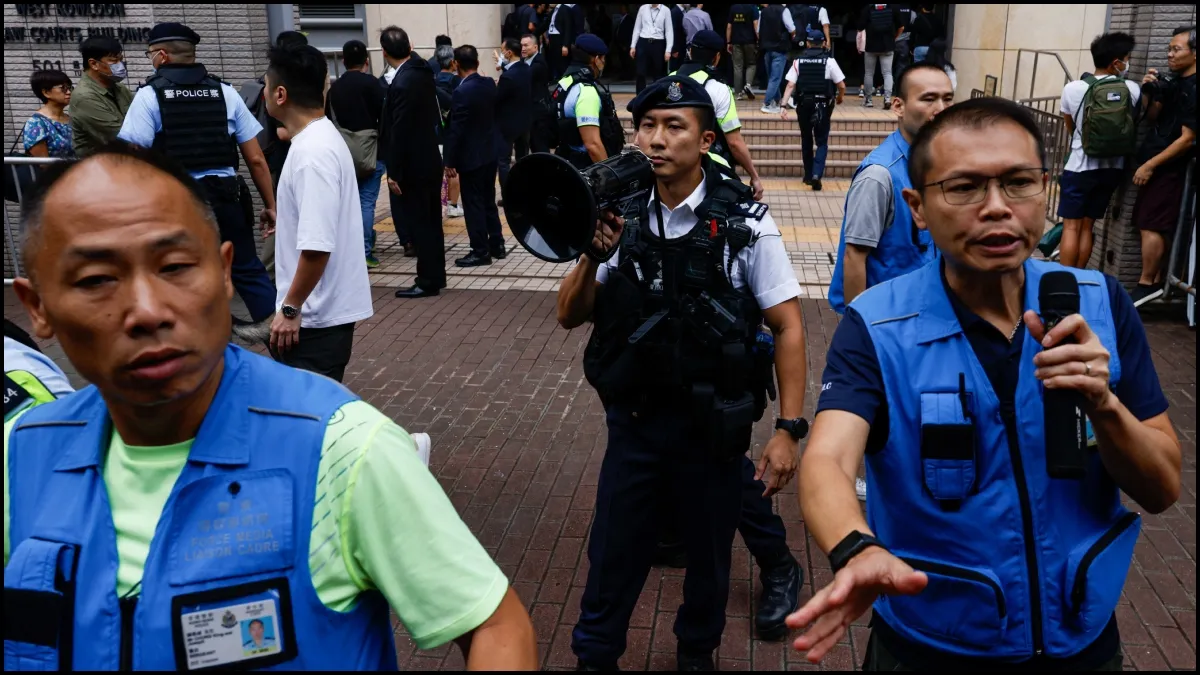Hong Kong: A Hong Kong court on Thursday convicted 14 pro-democracy activists, among the 47 advocates who were prosecuted in 2021 for their involvement in an unofficial primary election, in the city's biggest national security case under the Beijing-imposed law that has seemingly wiped out public dissent. These 47 democracy activists - eight women and 39 men- were accused of trying to "overthrow" the government by running unofficial primaries to pick opposition candidates for local elections.
Those who were found guilty included former lawmakers Leung Kwok-hung, Lam Cheuk-ting, Helena Wong and Raymond Chan. However, the three judges approved by the government to oversee the case acquitted former district councilors Lee Yue-shun and Lawrence Lau. Those convicted could face life in prison.
These activists were arrested by police in mass raids at homes across the city and charged with conspiracy to commit subversion under the Chinese-imposed national security law. Critics say the case is another example of how the law is being used to stifle political opposition and dissent since the massive anti-government protests in 2019, which could deal another blow to Hong Kong's rule of law and its reputation as a global financial hub.
Ahead of the highly publicised trial on Thursday, 31 defendants pleaded guilty and four of them became prosecution witnesses. The trial was criticised as "politically motivated" by the United States and other countries, who called for the accused to be immediately released. The trial was held under tight security at the West Kowloon Magistrates' Court where diplomats from the US, Britain and Europe have attended proceedings.
What is Beijing's national security law?
It is important to note here that Hong Kong had introduced a new national security law in March this year, which exacerbated fears of dwindling Western-style civil liberties that are fundamental to its allure as a global financial hub. The law was first introduced by China in 2020 and has been used to prosecute many leading activists, including media tycoon Jimmy Lai and former student leaders like Joshua Wong and Lester Shum. Others were silenced or forced into self-exile. The drastic political changes prompted a large number of young professionals and middle-class families to emigrate to other countries.
The national security law criminalises secession, subversion or collusion with foreign forces. The new law expands the government's power to stamp out future challenges to its rule, punishing treason and insurrection with up to life imprisonment. The law also includes stiff prison terms for other offences, including up to 20 years for espionage and up to 10 years for the unlawful disclosure of state secrets. Some provisions allow criminal prosecutions for certain acts committed anywhere in the world.
Additionally, tougher penalties would be imposed on people convicted of working with foreign governments or organizations to commit certain offences. For example, residents who damage public infrastructure with the intent to endanger national security could be jailed for 20 years — or life, if they collude with an external force to do so. The law could curb disruptive protests like the one in 2019 when dissenters occupied the airport and vandalized railway stations.
What is this case about?
The defendants are accused of a "vicious plot" to paralyse government and force the city's leader to resign through an unofficial pre-selection ballot in a July 2020 citywide election. The democrats maintained that it was an unofficial attempt to select the strongest candidates in a bid to win a historic majority in Hong Kong's legislature.
China had been rattled since the mass pro-democracy protests erupted in Hong Kong in 2019 against Beijing's plans for security legislation. The activists argued that China's plans infringed on freedoms guaranteed when Hong Kong was handed back to China by the British in 1997. Most of the accused have been arrested or sentenced since 2021 and were subjected to marathon bail hearings.
In a summary of the verdict distributed to media, the court said the election participants had declared that they would “either actively use or use the power conferred on the (Legislative Council) by the (Basic Law) to veto the budgets.” Under the Basic Law, the chief executive would be compelled to dissolve the legislature and eventually step down if major bills such as the budget were vetoed.
The court said that if the defendants had reached their aims, it would amount to “a serious interfering in, disrupting or undermining the performance of duties and functions in accordance with the law” by the Hong Kong government. Legal scholar Benny Tai, student leader Joshua Wong, lawmakers Claudia Mo were prosecuted in the main case and are among the 31 defendants who pleaded guilty to the charge of conspiracy to commit subversion. They have a better chance at shorter jail terms and will be sentenced at a later date.
The July 2020 primary was meant to shortlist pro-democracy candidates who would then run in the official election. It drew an unexpectedly high turnout of 610,000 voters, representing over 13 per cent of the city’s registered electorate. However, the election was postponed due to the COVID-19 pandemic and the electoral laws were later overhauled which drastically reduced the public's ability to vote and increasing the number of pro-Beijing lawmakers making decisions for the city.
(with inputs from agencies)
ALSO READ | Hong Kong enacts Article 23: How will contentious new national security law affect different walks of life?

